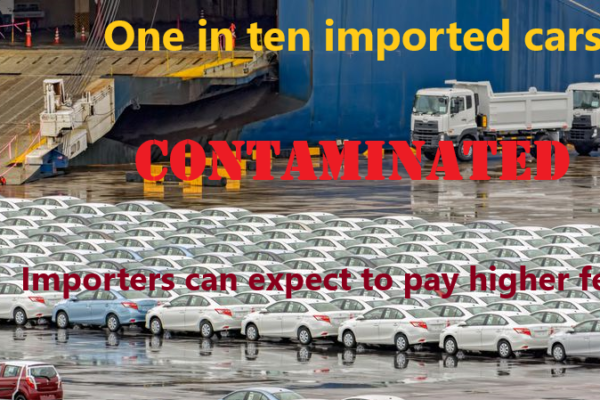During a port inspection of contaminated machinery at Lytton near the Port of Brisbane yesterday (27 April), Minister for Agriculture Fisheries and Forestry (DAFF) Murray Watt said biosecurity risk creators and beneficiaries have to “all pay our way.” Since January this year, 75,800 cars have moved through the Port of Brisbane, with 8000 of them already being contaminated – meaning one in ten of these vehicles are potential biosecurity time bombs.
The cost of importing and buying cars is expected to rise as Australia’s biosecurity measures are bolstered amid increasing threats. Exotic pests like snails and stinkbugs have been found to contaminate thousands of new cars waiting to enter the country at all Australian ports, leading to lengthy, almost year-long delays.
These pests pose a biosecurity risk to the nation and the government has said the $600 million spent on protecting the environment isn’t enough to combat a recent influx. Mr Watt urged manufacturers to remain vigilant with hygiene as the government will not risk the nation’s biosecurity.
This means the government is poised to charge higher fees to those importing things like cars and machinery. Mr Watt said his Department (DAFF) is consulting with importers about increasing biosecurity fees and charges on imports. He added that the new fee could also impact imports like farming machinery, industrial items or even fridges.
Some reports suggest the charges could go up by an extra $5 per imported item.
With the Treasurer due to hand down the Budget on Tuesday 09 May, Mr Watt said his Cabinet colleagues are negotiating hard to get the maximum funding for their portfolios. “But what I can say is that I am in active discussions with the Treasurer, the Finance Minister and my Cabinet colleagues about how much we should be spending on our biosecurity system and how that should be paid for,” he said.
A report carried by the Courier Mail yesterday (27 April) says: “At the Port of Brisbane, 7 percent of 12,500 containers inspected by biosecurity officers in the past 12 months had ‘high-level contamination,’ including pests such as giant African snails, bees, the flighted spongy moth or soil and plant contamination. Another 5 percent had other forms of contamination, such as feathers and smaller amounts of soil and plant material.”
In a recent interview with ABC News Breakfast, Mr Watt said, “So to give you a sense of the numbers – last year, and if we just focus on Queensland figures, the Port of Brisbane last year experienced a 4 per cent increase in the number of imported vehicles overall, but the number of contaminated vehicles coming into the Port of Brisbane increased by 62 per cent in 2022 compared to the year before. And we’re actually seeing even worse figures in other southern ports like Port Kembla and Melbourne, the numbers are even higher. So I guess while we are seeing a relatively small increase in the number of vehicles overall coming in, there’s been an absolute explosion in the number of contaminated vehicles. And that’s, unfortunately, what’s causing these backlogs.”
As we reported in March, thousands of Australians faced delays as new cars were caught up with cleaning after foreign soil and insects were found on vehicles that had been stored on grassy paddocks before export. DAFF says the cause of the problems lies with suppliers, importers and cleaning contractors.
The Queensland Government has posted a PDF document titled (click here) Vehicle and Machinery Cleandown procedures.
For correct information about your imports, including quarantine inspections and treatments, contact us here at Colless Young. As licensed Customs Brokers and International Freight Forwarders, we handle all your consignments – whether vehicles or general cargo – economically and professionally. Based in Brisbane, Colless Young provides a complete range of logistics services, including exports, both by sea and airfreight, at all major Australian ports and airports.

